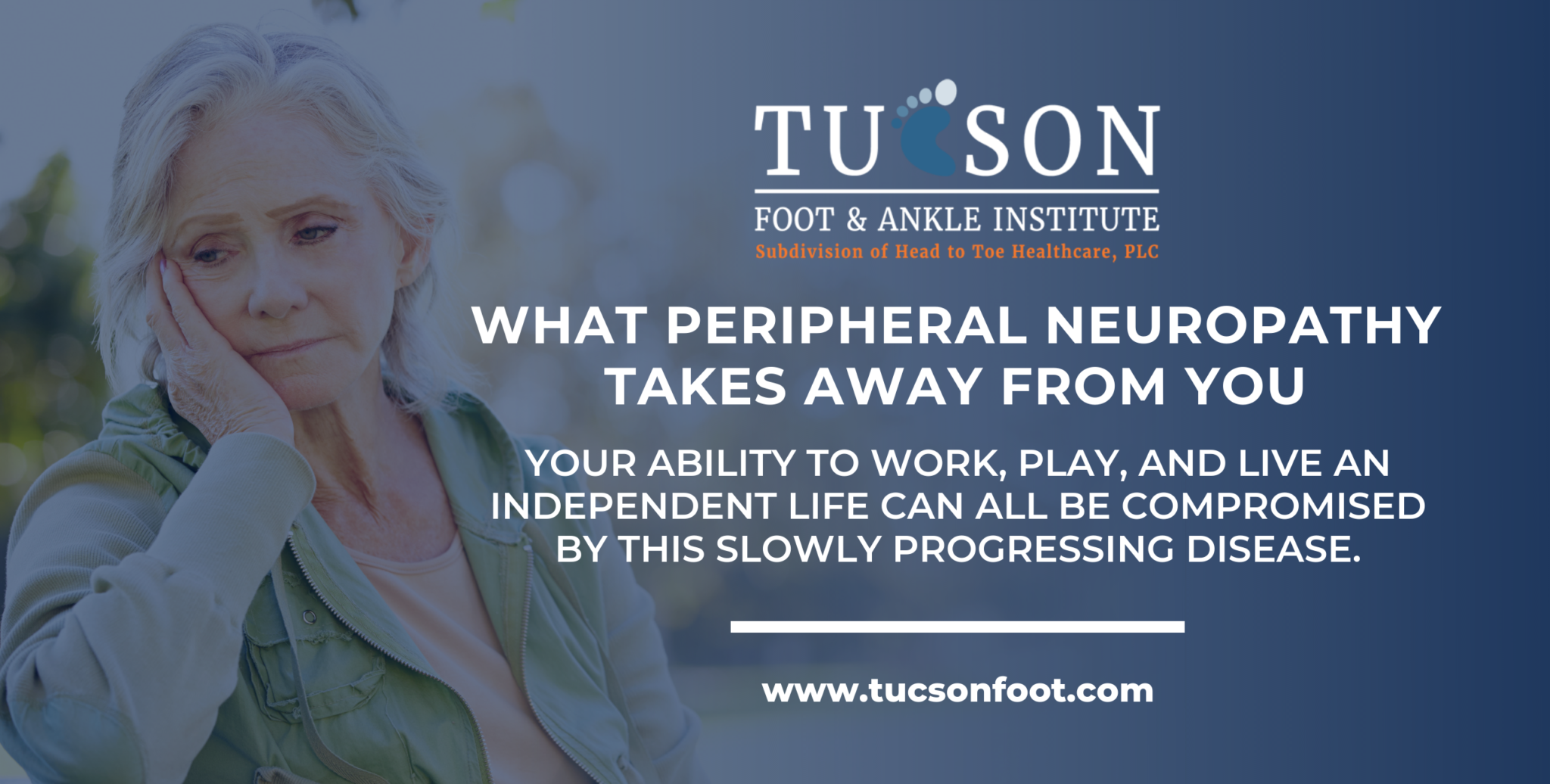What Peripheral Neuropathy Takes Away From You
Is life starting to pass you by?
If you’ve been struggling with peripheral neuropathy for a number of years, there’s a good chance that you have to answer this question with a “yes.”
And if you’ve only recently been diagnosed, and you’re still feeling “pretty good,” understand that if you don’t take appropriate steps now to control your condition, there’s a good chance you’ll get to the same place in the not-too-distant future.
The Steady Deterioration of Your Nerves
See, one of the defining characteristics of uncontrolled peripheral neuropathy is that, over the course of months and years, it slowly and steadily deteriorates. Your nerves continue to degrade, leading to progressively more pain and discomfort—until they stop working entirely and you experience total loss of sensation.
(While “no more pain” sounds almost like an improvement, the exact opposite is true—that’s when the danger to you and your health is the greatest.)
And before you shrug this off and say that you’re “too young” to start worrying—think again. While it’s true that most severe neuropathy sufferers tend to be older adults, that’s simply a function of mathematical probability. Those who develop peripheral neuropathy earlier in life will also tend to reach the advanced stages much earlier, too—sometimes even before turning 40.
The Practical Costs
In human terms, what is the cost and consequence of these progressively deteriorating nerves? Simply put, it’s a world that grows smaller, day by day, month by month, year by year.
As one of the leading peripheral nerve clinics in Arizona, we see it all the time. Our patients have often had to slowly back away from activities they used to love, and reduce their lifestyles tremendously.
And ultimately, these are the kinds of things that are truly the most devastating about a disease like peripheral neuropathy. Almost anybody can deal with a little pain every now and then. But losing the things and people you love? It’s much harder, and sadder.
What are you at risk of losing if you have peripheral neuropathy? Here are some examples.
Your Ability to Work
Physical labor may become difficult, unsafe, or impossible if you have severe peripheral neuropathy. It’s not just that standing or walking for long periods may become painful.
Muscle weakness, poor balance and coordination, and constant cramping are also possible symptoms of peripheral neuropathy that could endanger you on a job site. If you have to walk, bend, lift, and carry at work, or work around dangerous equipment, your neuropathy may prevent you from doing these things effectively or safely.
Hypersensitivity, too, could be an issue. Imagine involuntarily recoiling in pain any time your legs are bumped or jostled. Would that be compatible with a job at a warehouse, or at a school, or in health care, or in almost any other “physical” job? Probably not.
Even those who work typical “desk jobs” may not be safe. For one, sitting for long periods may be just as painful as standing for long periods. But beyond that, neuropathy may also affect your hands or even your eyes, impairing fine motor control and your ability to do detail-oriented tasks.
Your Favorite Activities
For the same reasons that you may no longer be able to work, you may also no longer be able to enjoy favorite hobbies and activities, either.
More times than we’ve been able to count, we’ve treated:
- Outdoor lovers who had to stop running, hiking, golfing, or hunting because they couldn’t walk more than five minutes without debilitating pain.
- Parents and grandparents who can’t take their children to the park or keep an eye on them for long periods of active play.
- Retirees who can’t enjoy vacations they’ve been planning for years because their feet won’t cooperate with any itinerary other than sitting on the beach (or in the hotel room).
- Crossword puzzle enthusiasts, knitters, or scrapbookers who have lost the fine motor control necessary to accomplish even these stationary, indoor tasks.

Your Ability to Drive
Driving is something most of us take for granted, but peripheral neuropathy can take that away from us, too. The bottom line? If you can’t feel your feet, you can’t operate a motor vehicle safely.
When you drive, you need to know a few things. One: Where your feet are positioned. Two: Where the pedals are positioned. And three: how much pressure you need to apply to a particular pedal at a particular point in time in order for the car to respond with the appropriate amount of acceleration or braking.
With severe peripheral neuropathy, your ability to do all three becomes compromised. This makes you a danger to yourself and others (not to mention your vehicle) on the road, or even just in your driveway.
Fortunately, there is an option for many people in this situation: hand controls for their vehicle. Most (though not all) ordinary cars and trucks with automatic or CVT transmissions can be converted to put pedal controls (and often even secondary controls like lights or horn operation) on a hand-operated lever, often attached to the steering column or center console. These controls can even be all-electronic in a new enough vehicle; in other cases, the lever may be bolted to the floor pedals for mechanical operation.
That said, converting your vehicle may be costly, and it will take some time re-learning how to drive in a new way.
Your Friendships
No, we’re not suggesting that your friends are going to abandon you just because you have neuropathy. True friendships will endure.
But realistically speaking, peripheral neuropathy can be an extremely isolating and lonely experience for a significant percentage of sufferers.
Let’s say you and your friends used to enjoy going hiking together—or going on a big Saturday shopping trip every couple of months. But now, thanks to your neuropathy, you can’t go anymore.
Maybe that trip doesn’t happen at all anymore. Or maybe your friends still go—just without you. It’s nobody’s fault, and ideally your friends will still try to include you in as many activities as you can realistically participate in.
But there’s also no getting around the fact that an inability to participate in common social functions will almost always lead to a reduction in overall social contact, and can often lead to connections drifting apart. It’s not inevitable, but it is common.
Your Independence
This is just the logical conclusion of everything that preceding paragraphs have been building up to.
When you can’t work, can’t drive, can’t enjoy any activity that requires more than a few minutes of standing or walking, even the fundamental, mundane tasks of life become insurmountable.
You may need someone else to do your grocery shopping for you, for example. Or you may lose the ability to do your own cooking, your own cleaning, your own maintenance around the house.
This isn’t just daily pain we’re talking about. It’s about a complete loss of your ability to live the life you want to live and do the things you want to do, when you want to do them, on your own terms.
The Next Step
Now, why did we write all this? Was it just so that we could make you feel bad?
Absolutely not. It’s a call to action.
Maybe you can already relate to a lot of these scenarios. Or maybe you can envision it as your future. Either way, help is available from Dr. Alan Shih, a peripheral nerve specialist at the Tucson Neuropathy Institute, a subdivision of the Tucson Foot & Ankle Institute and Head to Toe Healthcare, PLC.
We are one of Arizona’s most innovative and advanced centers for the treatment (and even reversal) of neuropathic pain. We’ve pioneered a combination therapy which may include guided injections, radiofrequency ablation, laser therapy, extremity nerve decompression surgery, and other cutting-edge tools to achieve the best possible results. So even if your neuropathy is already severe, and you’ve had it for years, there’s still a great chance we can help you.
Check out our service page on neuropathy for even more detailed information about the condition itself, as well as our treatment options.
Whether you’ve never seen a doctor about your neuropathy before, or you’ve been going to them for years without any success, we urge you to give us a call. We’d love the opportunity to help you get back the lifestyle you want to live—and keep it as long as possible.
To request an appointment, please use our online contact form, or give us a call at (520) 545-0202.
Don’t Wait to Ask for Help!
No matter how far along you are on the path of diabetic foot complications, we can help you. But in severe cases, the existing damage is not always completely reversible. And the longer you wait, the greater your risk of an injury, wound, or infection that leads to a catastrophic change in your quality of life. So don’t wait until it’s too late! The earlier you see us, the better we can help you. To schedule an appointment with Dr. Shih, please call (520) 545-5717 today.Contact Us
Office Hours:
Monday - Friday
8:00AM - 5:00PM
Tucson Foot & Ankle Institute:
7406 N. La Cholla Blvd.
Tucson, AZ 85741
Phone: (520) 545-0202
Fax: (520) 545-0201
© Tucson Foot and Ankle Institute. All Rights Reserved. | Privacy Policy



